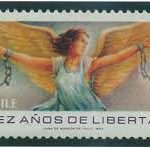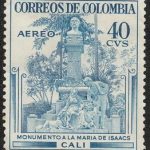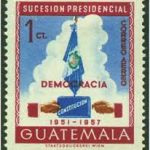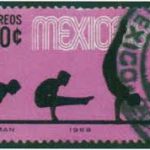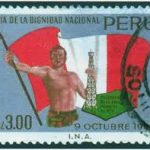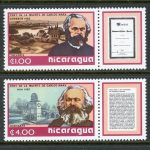 So what is popular culture? And, just as much to the point, what is not popular culture? What is the relationship between popular culture and “high” culture, or popular culture and the state? Can emotions or bodily states (tears, laughter?) be instances of popular culture? Here we look at definitions and boundaries, only to discover that these are necessarily fluid and in flux. Popular culture is hard to pin down.
So what is popular culture? And, just as much to the point, what is not popular culture? What is the relationship between popular culture and “high” culture, or popular culture and the state? Can emotions or bodily states (tears, laughter?) be instances of popular culture? Here we look at definitions and boundaries, only to discover that these are necessarily fluid and in flux. Popular culture is hard to pin down.
Sorry, no posts matched your criteria.
Latin American Postage Stamps
Some of the stamps mentioned by Jack Child…
Pancho Villa’s Tears
Pancho Villa facing the firing squad, 1912:

Formino Sámano facing the firing squad, 1917:

Villa and Emiliano Zapata in the Presidential Chair, 1914:

La fotografía tomada el 6 de diciembre de 1914, recoge el momento en que Pancho Villa, Emiliano Zapata y otros revolucionarios posan para la cámara en el salón presidencial de la República, tras llegar victoriosos a la capital. Imagen de autor, fotgrafía en el acervo de El Universal.
Villa on horseback (publicity shot by cameraman John Davidson Wheelan):

Villa at Madero’s tomb:

Pancho Villa Y Emiliano Zapata entran a la Ciudad de Mexico, Villa llora en la Tumba de Madero:
Pancho Villa llora la muerte de Madero:
Pancho Villa llora la muerte del general Fierro (from a feature film; I don’t know which one):
Final questions

How did this class change the way you see the world?
What have you learned from this class that you will carry with you into the rest of your life?
What is Popular Culture questions

Here are the questions you posed in your blogs in response to the articles by Jack Child and Andrea Noble…
Do you believe that tears are a form of communication? Furthermore, do you think that one’s acceptance of tears as a form of communication is influenced more by their individual beliefs/experiences or by their culture?
Are postage stamps icons used as a way to connect followers of two “kinds” of culture (high and popular) together?
Is popular culture defined by us or do we define it? Both? Neither?
I do wonder if we should start thinking of popular culture as something that is popularized by the people rather than by these groups of ordinary vs elite
Do you think popular culture can be produced by the government and the product made into something that we simply have to consume in order to, say, send a letter? Doesn’t something have to be popular also in a sense that people like it??
How politically effective do you think stamps are be today?
How significant is popular culture surrounding the revolution in relation to gendered national identity in Mexico?
What other forms of popular culture do you think are influenced by the state, are there any certain beliefs of facets of popular culture that we may think to be completely bottom-up but in fact not really so?
In today’s society, what can be considered something like the postage stamps that may represent particular cultures in a small platform?
Question for class: If tears can affect the way we feel, do you think tears (and other forms of emotion) can be weaponized/are already being weaponized to “control” the way we feel?
Anyone thought tears/emotions were related to culture? (i never thought about this ahaha) OR how is the manliness defined in other countries /your culture?
With who does the power of stamps to promote change lie?
Do you think it’s justified for Haiti/Belize to be so anxious over a stamp? How much power does a stamp really hold?
Do you think Child left out any important themes that can be conveyed from stamps? Why?
I’m perplexed towards our working definition of popular culture and don’t find it necessarily useful or accurate. The first concern is that there is no boundary as to what popular culture is: are stamps considered popular culture or just a symptom of general culture? Through our definition, who gets excluded or accidentally included by the term ‘ordinary people’? My general argument to our working definition is that it excludes many of the peoples whom we owe to our popular culture: communities of colour and the queer community as examples (There would be no modern make-up culture without drag queens and no Eminem without black artists). Essentially, our working-definition doesn’t give credit to the communities who deserve the accreditation. So, our working-definition is over accepting of stamps into the discourse on popular culture because of the thin and almost non-existent borders that it currently has, which isn’t to say that it has no place, but rather that we need clearer lines as to if it is to be accepted into this discourse especially since it excludes many perspectives at the same time.
what role do cameras play in our views and perceptions of public emotional expression? How does culture play into that?

